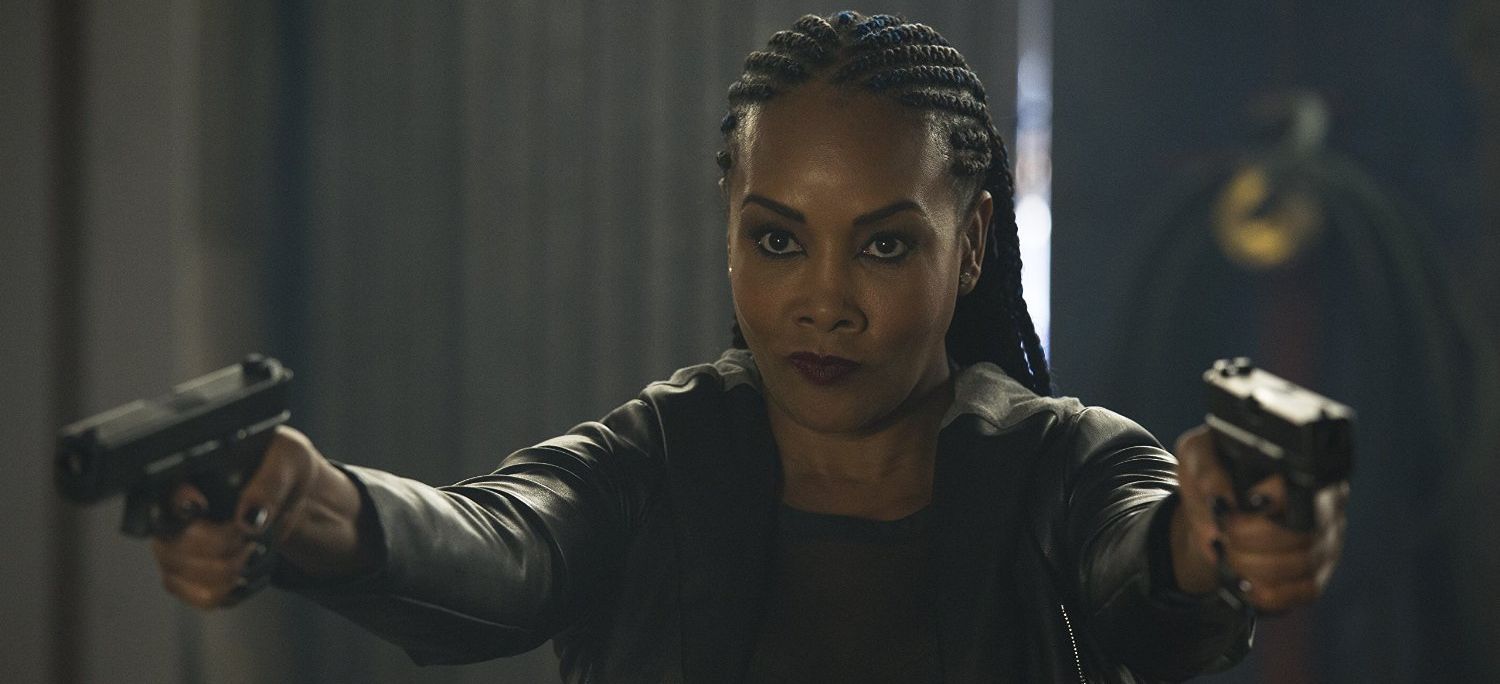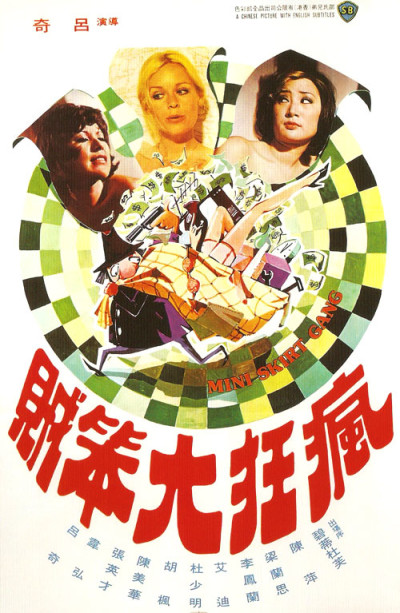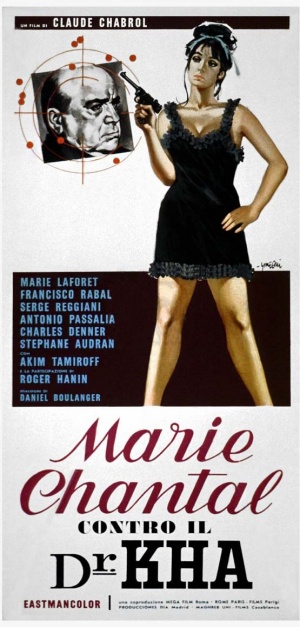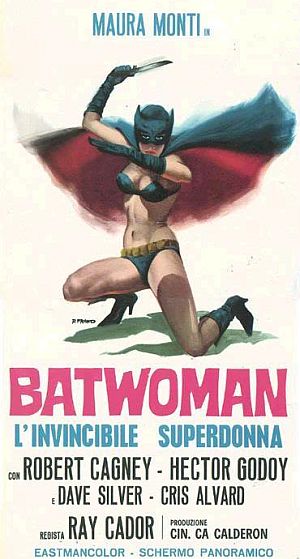 ★★★
★★★
“Somewhat Expendable…”
Credit to The Asylum for getting off their ass and actually making a female version of The Expendables, while every other producer to touch the idea, has so far been nothing but talk. Certainly, it’s a cast to die for, with some of the most renowned action heroine names from both the past (Cynthia Rothrock, albeit kicking less butt than I’d like – but hell, she’s 57 – and with a hairstyle which has to be seen to be believed) and present (Zoë Bell, whom we will watch in absolutely anything. And occasionally have). The rest of the cast is an interesting mix of has-beens (Brigitte Nielsen) and names you’ll recognize from other genre entries (Kristanna Loken, Vivica A. Fox). It’s not a bad cast, though one wished, instead of Nicole Bilderback, they’d got someone like Rina Takeda or Yanin Mitananda. On the other hand, having an Asian that’s not good at martial arts is about as close as this gets to going counter to stereotype.
4 mercenaries. 1 President’s daughter. 1 crazyass bitch. 6 badasses. @TheRealZoeBell @LokenKristanna pic.twitter.com/EEO9B8Apx5— Nikki Bilderback (@LadyBilderback) March 17, 2014
The scenario is basic but serves its purpose. The President’s daughter is kidnapped while on a trip to Kazakhstan by local warlord Ulrika (Nielsen). Her hatred of men leaves the best rescue solution to send in a team of women, hand-picked by CIA section chief or something Mona (Rothrock) from various prisons. There’s disgraced agent Raven (Fox), sharpshooter Kat (Loken), explosives expert Mei-Lin (Bilderback) and all-round bad-ass Clay (Bell), who is given the task of leading the group into the remote corner of Asia, infiltrating Ulrika’s lair and rescuing the “First Daughter”. They do so by faking Mei-Lin’s identity, claiming she’s the daughter of a rich industrialist, whom they’ve kidnapped, and offering her to Ulrika for the ransom possibilities. Of course, getting in is one thing: finding the President’s offspring, setting her loose, and then everyone escaping from the middle of nowhere back to the good old US of A is quite another.
Directed by Christopher Olen Ray, son of noted B-movie maestro Fred Olen Ray, easily the best thing about this are the characters. Nielsen may not have aged well, to put it mildly, but she’s still six foot tall, and looks like she could spit nails into floorboards. On the side of good, Bell and Fox, in particular, also capture the necessary spirit of marginally-restrained irritability, with Loken and Bilderback providing a little lightness for contrast. The banter between them is a bit of a mixed bag: I mean, “fucking George Clooney with a strap-on” sounds more like bizarre wish-fulfillment from writer Edward DeRuiter than anything a real woman might say. However, other moments do have a nice sense of authenticity, and you get the sense that each of the main characters have enough back-story to fuel an entire feature on their own. That’s in part because most of the actresses already are more than familiar to anyone with even a passing interest in action heroines. Even Bilderback, the least-known, was in the unaired pilot for Buffy the Vampire Slayer, so has at least a minor role in the history of our genre. It might have been fun if the script had played off their history more, riffing on Loken’s part in Terminator 3 in some way, or Fox’s in Kill Bill. After all, that’s why they’re all here, and I can’t think of a more loaded cast in GWG film history.
Unfortunately, what doesn’t work is the action. The most obvious problem is an excess of mediocre digital effects, particularly in the areas of muzzle flashes and blood. Few things work so well at taking the audience out of the moment, as when you start spotting things like that: generally, you are better off not having muzzle flashes at all, than doing them badly. But a much more egregious crime by Olen Ray is having a crown jewel like Zoë Bell, but taking her action scenes and running them through a cinematic wood-chipper. You need to do this kind of thing when you have an actress who can’t do her own action, and you need to hide a stunt double or to make them look better than they are. You do not need to do either when you have Bell: you stand back, point the camera in her direction – and might as well get some popcorn, since you’ll be there a while. What you get here instead, is like hiring Maria Callas, then having her lip-sync, and it’s aggravating as hell, with only a few flashes of the talent we know to be present. Compare and contrast the approach of Raze, which largely just got out of Bell’s way.
It’s a shame, because the film did so much right, from intent through to assembling a rock-solid cast, yet couldn’t finish off the process. The Asylum are notorious for their mockbusters e.g. Atlantic Rim, but this has enough fresh about it that it could have been one of the best films in their catalog (and, I should know because, dammit, I’ve seen far more of them than most people!). Hopefully, it’s still successful enough to merit a sequel, perhaps under someone with a better handle on shooting the action.
Dir: Christopher Douglas Olen Ray
Star: Zoë Bell, Brigitte Nielsen, Kristanna Loken, Vivica A. Fox








 Dear god, this is awful. The only reason this 1974 film manages the dizzy heights of 1 1/2 stars, is the finale, which is actually a pretty decent burst of comedy action, highlighted by the heroine receiving inspiration from a poster advertising a Peking Opera production of the Mulan legend. Up until then, it’s a rancid piece of film-making, wasting the talents of those involved. Well, the actresses anyway, since Lui Kei provides no evidence, in either his direction or script, that there was any talent present to begin with.
Dear god, this is awful. The only reason this 1974 film manages the dizzy heights of 1 1/2 stars, is the finale, which is actually a pretty decent burst of comedy action, highlighted by the heroine receiving inspiration from a poster advertising a Peking Opera production of the Mulan legend. Up until then, it’s a rancid piece of film-making, wasting the talents of those involved. Well, the actresses anyway, since Lui Kei provides no evidence, in either his direction or script, that there was any talent present to begin with. I’d probably better start of by explaining the above tagline, Chabrol was one of the leading lights of the French ‘New Wave’ cinema, alongside the likes of Truffaut and Godard: I’ve enjoyed the films of his I’ve seen, mostly later works such as L’Enfer or La Fille coupée en deux. But in the mid-60’s, he basically sold out, churning out a number of light spy spoofs. Regarding another of his works around this time, he said, “I really wanted to get the full extent of the drivel. They were drivel, so OK, lets get into it up to our necks.” It’s easy to see what he meant, for Marie-Chantal is undeniable drivel, though lacks the necessary enthusiasm to overcome those limitations. Through a chance encounter on a train, the titular heroine (Laforet) is given a piece of jewellery by a stranger. That makes her the target for spies from Russia and America, as she travels from the Alps to Morocco, and also the minions of evil overlord Dr. Kha (Tamiroff), for it holds the secret to a weapon of potential global destruction, that everyone wants to acquire.
I’d probably better start of by explaining the above tagline, Chabrol was one of the leading lights of the French ‘New Wave’ cinema, alongside the likes of Truffaut and Godard: I’ve enjoyed the films of his I’ve seen, mostly later works such as L’Enfer or La Fille coupée en deux. But in the mid-60’s, he basically sold out, churning out a number of light spy spoofs. Regarding another of his works around this time, he said, “I really wanted to get the full extent of the drivel. They were drivel, so OK, lets get into it up to our necks.” It’s easy to see what he meant, for Marie-Chantal is undeniable drivel, though lacks the necessary enthusiasm to overcome those limitations. Through a chance encounter on a train, the titular heroine (Laforet) is given a piece of jewellery by a stranger. That makes her the target for spies from Russia and America, as she travels from the Alps to Morocco, and also the minions of evil overlord Dr. Kha (Tamiroff), for it holds the secret to a weapon of potential global destruction, that everyone wants to acquire.
 A loose remake of a somewhat infamous 1980 horror movie [rejected by the BBFC and as yet unreleased in the UK], this is a nastily brutal and effective home-invasion story, with a maternal angle that’s both surprising and well done. On the run after a botched bank robbery, the three Koffin brothers end up in the wrong home, and end up with a houseful of hostages, who were visiting Beth Sohapi (King) and her husband. The criminals call on the rest of their family for help, led by their mother (De Mornay), who is 50% June Cleaver – even providing cake and ice-cream for the residents – and 50% Lizzie Borden, showing absolutely no restraint against anyone she perceives as threatening her brood. As the night progresses, a lot of skeletons come out and we discover the Sohapis definitely do not live up to their name…
A loose remake of a somewhat infamous 1980 horror movie [rejected by the BBFC and as yet unreleased in the UK], this is a nastily brutal and effective home-invasion story, with a maternal angle that’s both surprising and well done. On the run after a botched bank robbery, the three Koffin brothers end up in the wrong home, and end up with a houseful of hostages, who were visiting Beth Sohapi (King) and her husband. The criminals call on the rest of their family for help, led by their mother (De Mornay), who is 50% June Cleaver – even providing cake and ice-cream for the residents – and 50% Lizzie Borden, showing absolutely no restraint against anyone she perceives as threatening her brood. As the night progresses, a lot of skeletons come out and we discover the Sohapis definitely do not live up to their name… Inspired by the same poem as Disney’s much-loved feature, this has the same basic idea – a young woman impersonates a man in order to save her father from being drafted in the army. However, this takes a rather different approach, being much darker in tone, not that’s this is much of a surprise, I guess. It’s also a lot longer in scope, with Mulan (Zhao, whom you may recognize as the heroine/goalkeeper from Shaolin Soccer), rather than fighting a single campaign, becoming a career soldier and rising through the ranks as a result of her bravery in battle, eventually becoming a general, tasked with defending the Wei nation from the villainous Mendu (Hu). He has killed his own father in order to take control, and has united the nomadic tribes of the Rouran, amassing an army of 200,000 to invade Mulan’s home territory. She comes up with a plan to lure him into a trap, but when she is betrayed by a cowardly commander, things look bleak indeed for Mulan and Wentai (Chen), one of the few who know her secret.
Inspired by the same poem as Disney’s much-loved feature, this has the same basic idea – a young woman impersonates a man in order to save her father from being drafted in the army. However, this takes a rather different approach, being much darker in tone, not that’s this is much of a surprise, I guess. It’s also a lot longer in scope, with Mulan (Zhao, whom you may recognize as the heroine/goalkeeper from Shaolin Soccer), rather than fighting a single campaign, becoming a career soldier and rising through the ranks as a result of her bravery in battle, eventually becoming a general, tasked with defending the Wei nation from the villainous Mendu (Hu). He has killed his own father in order to take control, and has united the nomadic tribes of the Rouran, amassing an army of 200,000 to invade Mulan’s home territory. She comes up with a plan to lure him into a trap, but when she is betrayed by a cowardly commander, things look bleak indeed for Mulan and Wentai (Chen), one of the few who know her secret. Someone is abducting wrestlers, extracting serum from their pineal glands and dumping the bodies in the ocean, at various locations around the world. Most recently, Acapulco. Investigating the crime is Batwoman (Monti), a rich socialite who has a masked alter-ego that fight crime. Oh, and is also a pro wrestler. Which makes her ideal for this case, since she can hang around the gym and check out suspicious characters, while working on moves with her fellow luchadorettes [Not a real word, but I like it]. Who is involved? The blind lottery ticket salesman? The chief of police? Or Dr. Williams (Cañedo), who won’t let anyone on to his ship, which is called Reptilicus, by tha way, and who possesses a sidekick called Igor? Go on, take a wild stab in the dark…
Someone is abducting wrestlers, extracting serum from their pineal glands and dumping the bodies in the ocean, at various locations around the world. Most recently, Acapulco. Investigating the crime is Batwoman (Monti), a rich socialite who has a masked alter-ego that fight crime. Oh, and is also a pro wrestler. Which makes her ideal for this case, since she can hang around the gym and check out suspicious characters, while working on moves with her fellow luchadorettes [Not a real word, but I like it]. Who is involved? The blind lottery ticket salesman? The chief of police? Or Dr. Williams (Cañedo), who won’t let anyone on to his ship, which is called Reptilicus, by tha way, and who possesses a sidekick called Igor? Go on, take a wild stab in the dark… No, seriously. That title was actually used for the movie in Germany, shamelessly evoking the Jolie vehicle. It’s understandable, since they do have a lot in common. Secret agent Ahn Su-Ji (Kim) splits up with her boyfriend Jae-Joon (Kang), who is upset over her deceit, not knowing it’s in the name of national security. Three years later, they meet up again, and it’s clear the spark is still there. However, she doesn’t know that he is now an agent for another branch of the Korean intelligence services. Of course, with the amazing luck that only ever happens in action rom-coms like this, they are working on the same case, and closing in on the same plan to detonate a biological weapon in Korea. Their actions each come to the attention of the other’s organization who both decide they are dealing with a traitor.
No, seriously. That title was actually used for the movie in Germany, shamelessly evoking the Jolie vehicle. It’s understandable, since they do have a lot in common. Secret agent Ahn Su-Ji (Kim) splits up with her boyfriend Jae-Joon (Kang), who is upset over her deceit, not knowing it’s in the name of national security. Three years later, they meet up again, and it’s clear the spark is still there. However, she doesn’t know that he is now an agent for another branch of the Korean intelligence services. Of course, with the amazing luck that only ever happens in action rom-coms like this, they are working on the same case, and closing in on the same plan to detonate a biological weapon in Korea. Their actions each come to the attention of the other’s organization who both decide they are dealing with a traitor. Mexican culture is just so damned
Mexican culture is just so damned